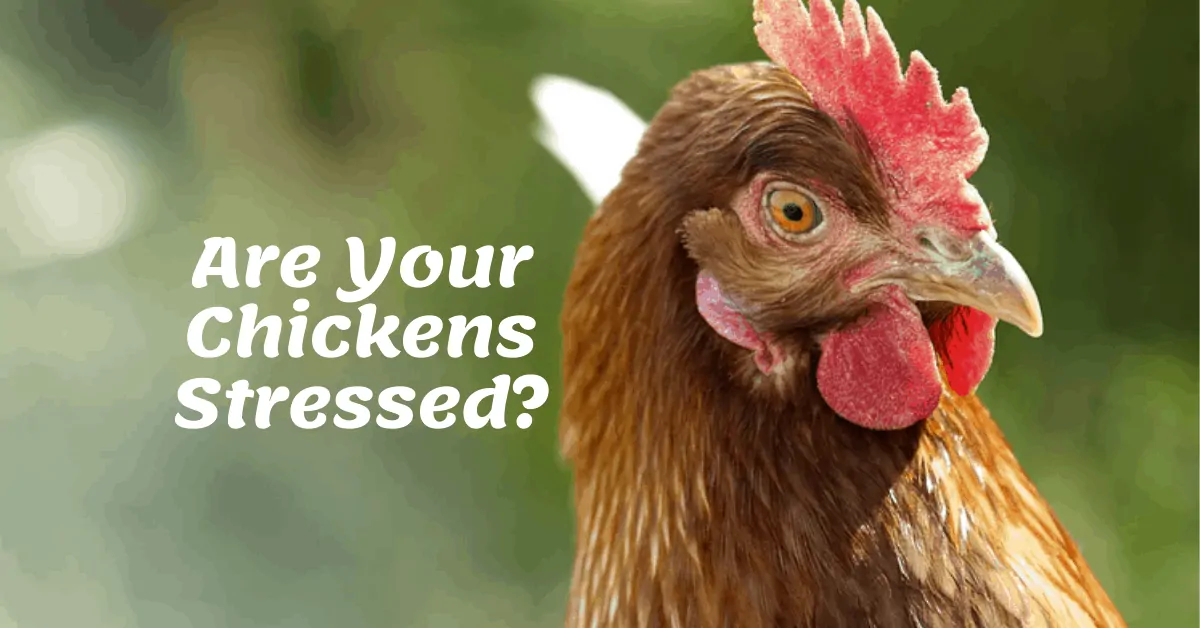Got stressed chickens? You’re not alone. Many of us face this problem and need answers on how to return our flocks to their happy pecking selves.
Why Are My Chickens Stressed? Stress has many faces; all of them can directly affect your flock’s egg productivity and overall health. Making sure your chickens are happy and healthy is easy once you know what to look out for and understand how to fix the problems.
This article will go over many of the usual stress causing problems. How to fix them and what you can do to prevent them altogether.
Plentiful Food, Water And Safe Place To Roost Is The Start Of Having A Stress Free Flock
Having plentiful food, water, and a safe place to roost is the start of having a stress free flock.
A sudden change in feed, brand, or type, can cause stress with your hens. If you must change feed, do it gradually by mixing it into the preexisting feed over time until the transition is complete. Slowly changing your chicken’s food will help ease stress over their new diet.
Always be sure there is plentiful freshwater, even multiple feed/water stations in larger flocks.
Hen To Rooster Ratio
If you have less than ten hens, only having one rooster is a general rule of thumb as the roosters will over breed the hens, harass them and fight for their “favorite” hen, causing unnecessary wear and tear on your girls.
If you are just in it for the eggs, no rooster at all is just fine!
Avoid Overcrowding
Overcrowding can be a big issue and quickly cause stress in laying hens.
If your girls are not able to free-range, there should be 8 to 10 square feet (0.93 m²) per chicken within the run and 3 square feet (0.28 m²) per bird within the coop.
Overcrowding can cause more than just stress; it can lead to parasites, disease, and even cannibalism!
Pets, Predators, and Children- Oh my!
Your sweet and loving Fido (or even kitty) can cause immense stress for your girls by merely just being there or by antagonizing them from the outside of the coop;
One good scare can cause a hen to stop laying for days or longer.
Wild animals can also be a big problem. You must provide a predator-proof coop for your chickens!
How to predator-proof a chicken coop?
Last but not least, kiddos! Kids can be overbearing and highly frightening to a flock of chickens; too much handling, being chased, yelling/screaming, riding by on big wheels, bikes and wagons could all stress a hen into not laying, even more so if they were not raised in that type of environment.
Pathological Problems
Having unsanitary situations, such as damp bedding, muddy runs, and just overly dirty pens, can lead to; molds, fungi, high ammonia, coccidiosis, and more.
No hen wants to lay eggs in standing mud or filth!
Dry, clean, and fresh air environments are a must!
Use deep bedding, like straw, pine shavings, leaf litter, or a mixture of all.
Tip: (DO NOT use cedar shavings! Why shouldn’t you use cedar shavings? Find out here.)
Be sure the coop has ventilation, as stagnant air can cause respiratory issues even if kept decently clean, especially in hot, humid climates.
Keep Your Friends Close And Your Enemies At A Distance!
Adding a new bird or a few can stress your preexisting flock, especially if the new kid on the block is overly dominant and tries to overthrow the queen bee in the coop.
Introduce new birds slowly by making those introductions via separation by a cage or pen next to the coop.
But PLEASE do this only after a quarantine period for the new fowl. You don’t want to introduce parasites or diseases to your flock.
Icky Itchy Bugs (Parasites).
Mites and lice can cause a halt in egg production along with other health concerns.
Signs of mites or lice can be the reason for reduction or halt in laying, pale comb/wattles, anemia, feather loss, irritated skin, and even death.
Mites & lice are tiny and hard to see, check around your hen’s vent and under her wings.
In extreme or prolonged cases, the offenders will leave pale-colored egg clusters on the base of feathers. Treat the birds, pen, coop, and nests quickly and repeat the treatment overtime to assure they are gone!
We recommend using the following products to treat mites and lice in your chickens.
Lighting And Seasons
Hens need at least 12 hours of daylight to continue laying, 14 to 16 hours will make them lay at top production.
You can add artificial light in the seasons of short days.
I recommend having a light at the coop set on a timer to turn on early in the morning, and shut off once the light is at prime time. That way, the girls can bed naturally with the sunset, which equals less stress on body and mind!
Make a note; some breeds are more tolerant of hot or cold than others. Research your breeds VS your local climate. Your location can directly affect your ladies’ production.
In summary
A lot of things can make your chickens stressed. Stress equals unhappy chickens, and unhappy chicken equals less or no eggs.
Make sure you are providing enough food and water. Be mindful of switching your chickens brand of feed to do it slowly and over time.
Try not to have too many rosters in your pen with your hens. A one-to-ten ratio of rooster over hens is best. You can skip the roosters all together if you just want eggs.
Avoid overcrowding; make sure your birds have enough space to scratch and peck.
Predators and the like will cause your hens massive stress. What might not be an actual predator can appear to be one by your ladies. Make sure your children and pets keep their distance if your ladies are not used to that type of environment.
Introduce new birds slowly and separately. You don’t want a new hen to think she’s the queen bee. Separating your new chickens from your older flock will help establish the pecking order and create boundaries more effectively.
Parasites are not your chicken’s friends. Make sure you spot tell-tell signs of parasites and treat them as quickly as you can.
Proper lighting is a must for peak production of eggs. Using an artificial source will help you increase your production rate if it is falling due to low light seasons.
More things can cause your chicken’s stress. But for the most part, we covered the basics and should allow you to make your ladies a lot happier.
I want to thank you for reading this article. I hope it gives you some insights and helps you keep your hens stress free.
If you have any questions reach out to our email [email protected]
OhCluck.com is a participant in the Amazon Services LLC Associates Program, an affiliate advertising program designed to provide a means for sites to earn advertising fees by advertising and linking to Amazon.com
Comments
0 comments

